Five reasons Ole Gunnar Solskjaer is a Manchester United legend
- Published
Archive: Solskjaer scores for Man Utd against Liverpool
If you were born at the end of the 20th century, the chances of you remembering Manchester United's new caretaker manager Ole Gunnar Solskjaer playing are minimal.
The Norwegian striker had 11 seasons under the reign of Sir Alex Ferguson, scoring 126 goals in 366 appearances, but has not had anywhere near the same impact in the managerial world.
Solskjaer has enjoyed two successful spells with Norwegian club Molde but, between those, he lasted less than nine months at Cardiff City and got them relegated from the Premier League.
So why is it that Solskjaer will return to Old Trafford as an icon and hero?
THAT goal
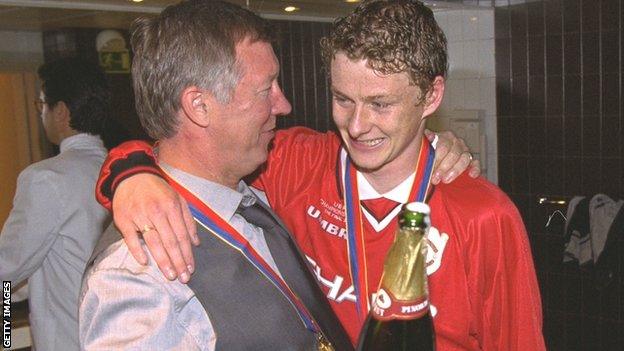
Picture the scene.
It's the 26 May 1999, Bayern Munich are playing Manchester United at the Nou Camp in Barcelona, there are centre-partings everywhere.
It's 1-0 to the Germans in the 90th minute of the Champions League final - the trophy literally already has blue and red ribbons on it.
United have barely had a shot on target all game - Fergie, who is taking it out on his chewing gum, brings Solskjaer on in the 80th minute.
Just after the fourth official signals three injury-time minutes, Teddy Sheringham swipes the ball into the corner of the net and, somehow, United are back in the game.
Then with 90+3 minutes on the clock, a David Beckham corner is nodded down by Sheringham and Solskjaer jabs out a boot to turn it high into the Bayern net. They've done it!
Mad celebrations (including a knee slide) begin and will continue long into the year with United becoming the first team to win the treble of the Premier League, FA Cup and Champions League in the same season.
And thus, the Norwegian's status as a Manchester United legend was cemented.
THAT tackle
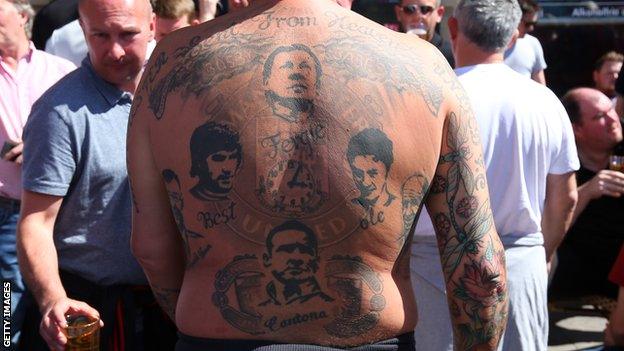
Immortalised in ink - Solskjaer lines up alongside George Best and Eric Cantona
Another defining moment for Solskjaer, during a Premier League match against Newcastle United in 1998.
The match was tied at 1-1, and United needed at least a draw to keep up with Arsenal in the race for the league title.
The Magpies' Rob Lee was sprinting unchallenged towards United's goal, but Solskjaer, with all the fierce determination of a honey badger, chased him down and swiped Lee's legs from under him.
In doing so, Solskjaer committed a professional foul and ended up back in the changing room before the end of the match. He was given a standing ovation by the United fans., external
His heroics were ultimately in vain - Arsenal completed a league and FA Cup double - but to this day, fans regard the move as a prime example of how Solskjaer would sacrifice himself for the good of the club.
He's a nice guy...
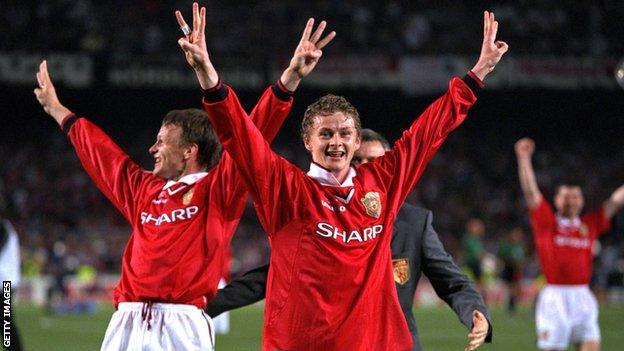
If you have one of those names that you have to spell for people all the time, you will feel OGS's pain.
But Solskjaer has had more than 20 years of people pronouncing his name wrong in the UK, and yet has never really minded.
So repeat after me:
Emphasis on the bolded-up syllables...
"Oo-la Goo-nar Soool-shkire"
So now you know.
The baby-faced assassin
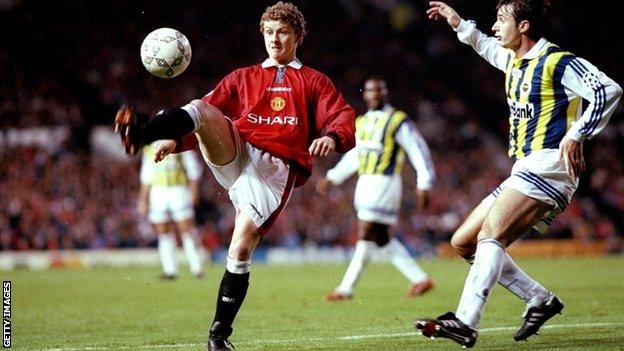
Solskjaer's youthful looks, blonde curls, sweet smile and killer instincts on the field earned him the nickname the 'Baby-Faced Assassin'.
Former team-mate David Beckham told the Telegraph he remembers Solskjaer "walking into the dressing room and thinking how young he looked - he had such a baby face".
"I will never forget when he came on as a sub at Nottingham Forest and within 10 minutes had scored four goals" he added.
And that was his thing...
Solskjaer built a reputation of being able to rescue United from the jaws of defeat, with Sir Alex Ferguson regularly summoning him from the bench if his side needed a goal.
His loyalty to Manchester United
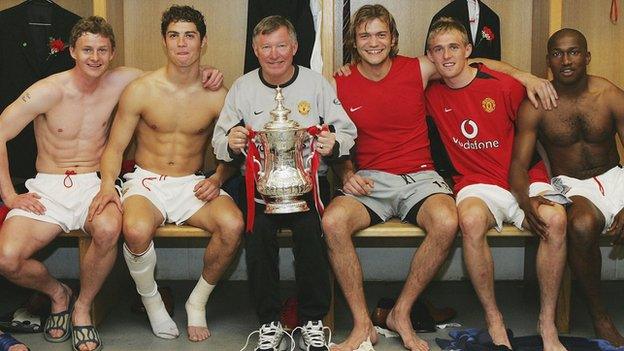
Despite being used as a sub the majority of the time, Solskjaer never minded.
He told FourFourTwo in 2016: "I didn't mind. Obviously I wanted to prove to the gaffer that I deserved to play more, but he had me exactly where he wanted me.
"He knew that when he put me on the bench I'd be rather irritated [we may have changed his words here a little], but I'd come on and give my all.
"I'd rather have that role and make an impact than play 200 games and be average."
So that's what he did.
In 1998, then United chairman Martin Edwards and Alan Sugar (Tottenham's part-owner at the time) had agreed a fee but Solskjaer remained in Manchester, despite the promise of more game time at Spurs.
"I didn't want to go; my agent did. He said he had never met a person as stubborn as me. But I was right. I normally am!"